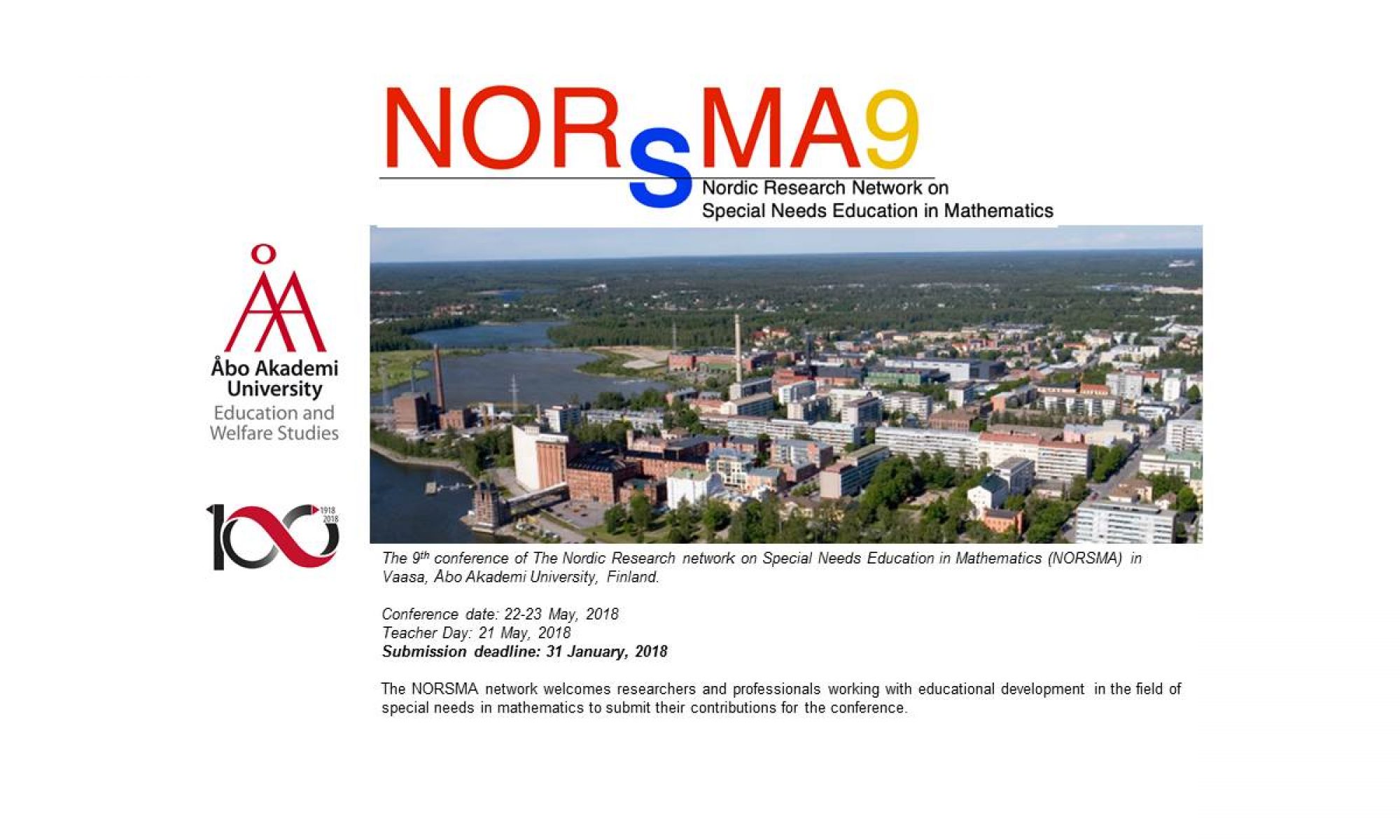Program:
You can download the program as a pdf-document here: NORSMA9_program
Tuesday 22.5.2018:
9.30 Conference registration and coffee
10.00 Opening of the conference:
Fritjof Sahlström, Dean, Faculty of Education and Welfare Studies, Åbo Akademi University
Arne Engström, NORSMA scientific committee, Karlstad University, Sweden
10.30-12.00 Paper presentations 1 (3 parallel sessions)
12.00-13.00 Lunch
13.00-14.30 Paper presentations 2 (3 parallel sessions)
14.30-15.00 Coffee
15.00-16.15 Keynote 1: Bert De Smedt
19.00 Conference Dinner
Wednesday 23.5.2018:
9.00-10.00 Keynote 2: Pirjo Aunio
10.00-10.15 Coffee
10.15-11.45 Paper presentations 3 (3 parallel sessions)
11.45-12.00 Closing of the conference
12.00-13.00 Lunch
Paper sessions 1: Tuesday (22.5) 10.30-12.00
Session 1A, room F606
Symposia
The role of the working memory and language skills in the prediction of arithmetic skills, and word problem solving at kindergarten and second grade
Kyttälä FIN
The effects of explicit instruction intervention in K-2 students with low performance
Aunio FIN
The connection of student’s arithmetic skills in 5th grade with student self-assessment and teacher assessment of students’ emotional and behavioral strengths in 5th, 6th, and 9th Grades
Hakkarainen FIN
Dimensionality of math anxiety and its longitudinal associations with math performance in adolescent students
Korhonen FIN
Session 1B, room C302
Pedagogical tactfulness – relational study about the incalculable in mathematics teaching
Ljungblad SWE
The nature of knowing in relation to students in need of special education in mathematics
Roos SWE
Universal Design for Assessment (UDA) in Undergraduate University Mathematics: Comparing Access and Target Skills Between Digital Self-Assessment and Traditional Course Exam
Nieminen FIN
Special need teacher’s descriptions and the relationship between educational objectives
Johnsen NOR
Session 1C, room D406
Sosiometrisesti suosittujen, torjuttujen, ristiriitaisten, huomiotta jätettyjen ja keskimääräisten lasten väliset erot käyttäytymisen ja tunne-elämän vahvuuksissa.
Rytioja FIN
Pathways to educational aspirations
Widlund FIN
Cognitive Profiles Predicting Reading and Arithmetic Skills at Grade 1 and at Grade 7
Korpipää FIN
Session 2A, room F606
Enhancement of SFON and cardinality related skills at day care
Hannula-Sormunen FIN
Baseline assessment: Effects of cognitive skills and parental SES to the number
Räsänen FIN
Early identification of risk of arithmetical difficulties
Reikerås NOR
Addition and subtraction skills of Norwegian and Finnish third graders Mononen NOR
Session 2B, room C302
Students in mathematical difficulties – teachers and students about low performance
Karlsson SWE
Students attaining low results in mathematics
Dalvang NOR
Resources for competence building in Norway
Olaug Ellen Lona Svingen NOR
Inclusion and student collaboration in the classroom
Mette Lykke Krogh DEN
Formative Assessment from Special Education Teachers’ perspective
Andersson SWE
Session 2C, room D406
Grade 1, 4 and 7 students’ comprehensions strategies when reading their mathematics textbook
Segerby SWE
Developing Dysfunctional Arithmetic Methods When Playing an iPad game
Rietz SWE
Differences in learning outcome between low achievement pupils in mathematics with, versus without, special needs education
Skorpen NOR
Dyscalculia interview as bridge between neurocognition and mathematics education
Lindeskov DEN
Paper sessions 3: Wednesday (23.5) 10.30-12.00
Session 3A, room F606
Symposia
How are arithmetic skills in the four operations related for boys and girls
Sunde DEN
Change and stability in the Mathematical Performing Groups in Grade One
Hellstrand FIN
Developmental Profiles in Mathematics of Students with ID in Inclusive Classrooms
Schnepel SUI
Improving numeracy skills in low-performing first graders: A Randomized Controlled Trial
Lopez-Pedersen NOR
Session 3B, room C302
Reciprocal predictions between interest, self-efficacy, and performance during an inductive reasoning task
Niemivirta FIN
Early identification of reading and writing difficulties
Risberg FIN
Behavioral Executive Functions and arithmetic fluency in primary school children
Husberg FIN
How schooling affects Spontaneous Focusing on Numerosity and arithmetical skill
Nanu FIN
Session 3C, room D406
Les Misérables – Elever med mycket låga prestationer i matematik
Engström SWE
Pedagogical Relational Teachership, PeRT – A multi-relational perspective
Ljungblad SWE
What happens when… everyone counts
Vennberg SWE
A Decade of Mathematics Education and Dis/abilities Research: Directions for Future
Tan USA
